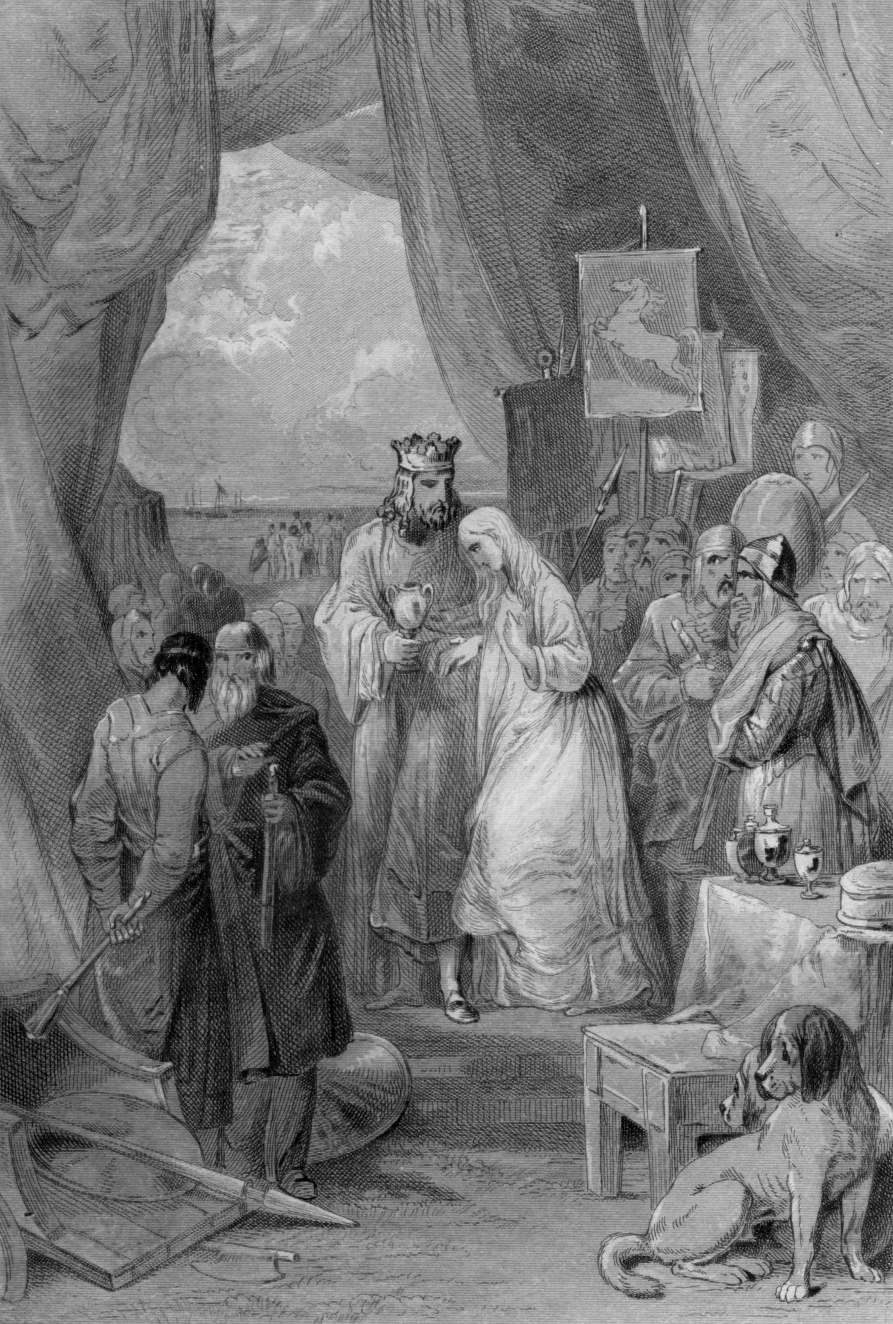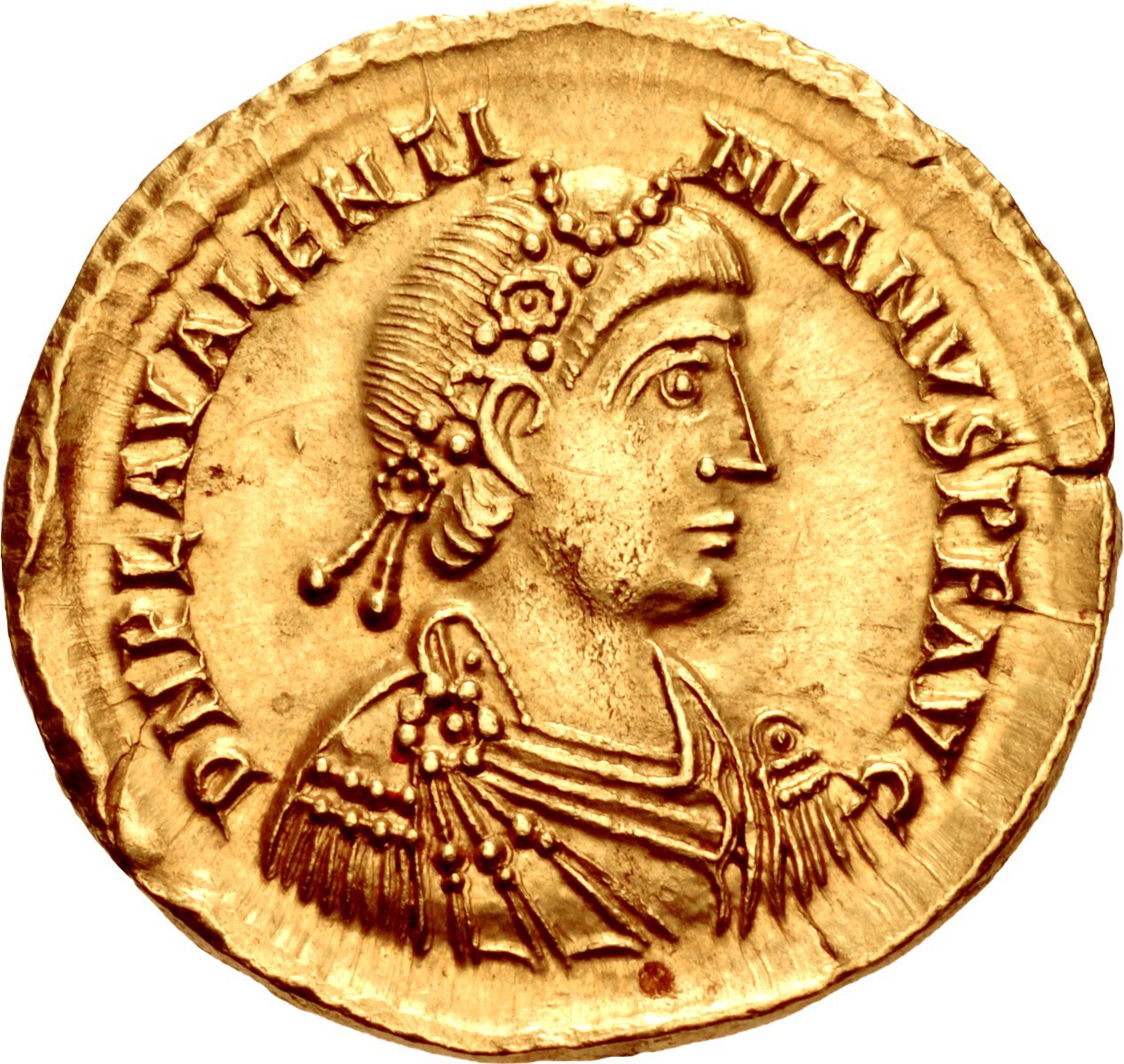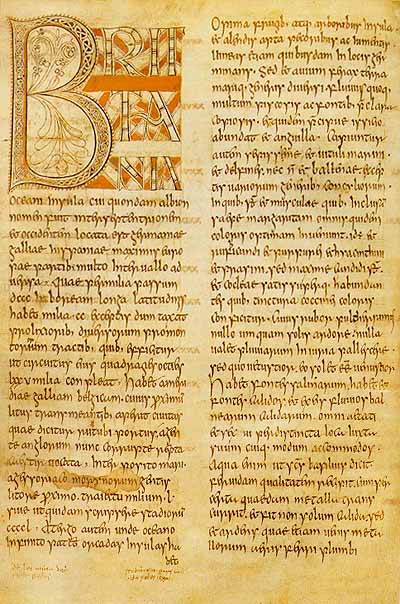|
Vortigern Gwrtheneu
Vortigern (; owl, Guorthigirn, ; cy, Gwrtheyrn; ang, Wyrtgeorn; Old Breton: ''Gurdiern'', ''Gurthiern''; gle, Foirtchern; la, Vortigernus, , , etc.), also spelled Vortiger, Vortigan, Voertigern and Vortigen, was a 5th-century warlord in Britain, known perhaps as a king of the Britons or at least connoted as such in the writings of Bede and Gildas. His existence is contested by scholars and information about him is obscure. He may have been the "superbus tyrannus" said to have invited Hengist and Horsa to aid him in fighting the Picts and the Scots, whereupon they revolted, killing his son in the process and forming the Kingdom of Kent. It is said that he took refuge in North Wales, and that his grave was in Dyfed or the Llŷn Peninsula. Gildas later denigrated Vortigern for his misjudgement and also blamed him for the loss of Britain. He is cited at the beginning of the genealogy of the early Kings of Powys. Medieval accounts Gildas The 6th-century cleric and h ... [...More Info...] [...Related Items...] OR: [Wikipedia] [Google] [Baidu] |
Vortigern And Rowena
''Vortigern and Rowena'', or ''Vortigern, an Historical Play'', is a play that was touted as a newly discovered work by William Shakespeare when it first appeared in 1796. It was eventually revealed to be a Shakespeare hoax, the product of prominent forger William Henry Ireland. Its first performance was on 2 April 1796, when it was ridiculed by the audience. Its titular protagonists, Vortigern and Rowena, are figures from Britain's traditional history. History Ireland had produced several earlier documents he claimed represented the writings of Shakespeare, but ''Vortigern and Rowena'' was the first play he attempted. He shortly followed it with a forged ''Henry II''. He had announced his "discovery" of the lost play as early as 26 December 1794 but did not show his father a manuscript until March 1795. He also provided a purported correspondence between Shakespeare and a printer explaining why the play was unpublished, as well as a deed accounting for how it came to be in han ... [...More Info...] [...Related Items...] OR: [Wikipedia] [Google] [Baidu] |
Anglo-Saxon Settlement Of Britain
The Anglo-Saxon settlement of Britain is the process which changed the language and culture of most of what became England from Romano-British to Germanic peoples, Germanic. The Germanic-speakers in Britain, themselves of diverse origins, eventually developed a common cultural identity as Anglo-Saxons. This process principally occurred from the mid-fifth to early seventh centuries, following the Roman withdrawal from Britain, end of Roman rule in Britain around the year 410. The settlement was followed by the establishment of the Heptarchy, Anglo-Saxon kingdoms in the south and east of Great Britain, Britain, later followed by the rest of modern England, and the south-east of modern Scotland. The available evidence includes the scant contemporary and near-contemporary written record, archaeological and genetic information. The few literary sources tell of hostility between incomers and natives. They describe violence, destruction, massacre, and the flight of the Romano-Britis ... [...More Info...] [...Related Items...] OR: [Wikipedia] [Google] [Baidu] |
Valentinian III
Valentinian III ( la, Placidus Valentinianus; 2 July 41916 March 455) was Roman emperor in the West from 425 to 455. Made emperor in childhood, his reign over the Roman Empire was one of the longest, but was dominated by powerful generals vying for power amid civil wars and the invasions of Late Antiquity's Migration Period, including the campaigns of Attila the Hun. He was the son of Galla Placidia and Constantius III, and as the great-grandson of Valentinian I () he was the last emperor of the Valentinianic dynasty. As a grandson of Theodosius I (), Valentinian was also a member of the Theodosian dynasty, to which his wife, Licinia Eudoxia, also belonged. A year before assuming the rank of ''augustus'', Valentinian was given the imperial rank of ''caesar'' by his half-cousin and co-emperor Theodosius II (). The '' augusta'' Galla Placidia had great influence during her son's rule. During his early reign Aetius, Felix, and the ''comes africae'', Bonifacius all competed ... [...More Info...] [...Related Items...] OR: [Wikipedia] [Google] [Baidu] |
Marcian
Marcian (; la, Marcianus, link=no; grc-gre, Μαρκιανός, link=no ; 392 – 27 January 457) was Roman emperor of the East from 450 to 457. Very little of his life before becoming emperor is known, other than that he was a (personal assistant) who served under the commanders Ardabur and his son Aspar for fifteen years. After the death of Emperor Theodosius II on 28 July 450, Marcian was made a candidate for the throne by Aspar, who held much influence because of his military power. After a month of negotiations Pulcheria, Theodosius' sister, agreed to marry Marcian. Zeno, a military leader whose influence was similar to Aspar's, may have been involved in these negotiations, as he was given the high-ranking court title of patrician upon Marcian's accession. Marcian was elected and inaugurated on 25 August 450. Marcian reversed many of the actions of TheodosiusII in the Eastern Roman Empire's relationship with the Huns under Attila and in religious matters. Marcian ... [...More Info...] [...Related Items...] OR: [Wikipedia] [Google] [Baidu] |
Jutes
The Jutes (), Iuti, or Iutæ ( da, Jyder, non, Jótar, ang, Ēotas) were one of the Germanic tribes who settled in Great Britain after the departure of the Romans. According to Bede, they were one of the three most powerful Germanic nations, along with the Angles and the Saxons: There is no consensus amongst historians of the origins on the Jutes. However, there is some archaeological evidence to support a theory that they originated from the eponymous Jutland Peninsula (then called ''Iutum'' in Latin) and to have populated parts of the North Frisian coast. Based on contemporary sources, it appears that they were a tribe of admixed Gutones, Cimbri, Teutons and Charudes, also called ''Eudoses'', ''Eotenas'', ''Iutae'' and ''Euthiones''. The Jutes invaded and settled in southern Britain in the later fifth century during the Migration Period, as part of a larger wave of Germanic settlement into Britain. Settlement in southern Britain During the period after the Ro ... [...More Info...] [...Related Items...] OR: [Wikipedia] [Google] [Baidu] |
Angles
The Angles ( ang, Ængle, ; la, Angli) were one of the main Germanic peoples who settled in Great Britain in the post-Roman period. They founded several kingdoms of the Heptarchy in Anglo-Saxon England. Their name is the root of the name ''England'' ("land of Ængle"). According to Tacitus, writing around 100 AD, a people known as Angles (Anglii) lived east of the Langobards and Semnones, who lived near the Elbe river. Etymology The name of the Angles may have been first recorded in Latinised form, as ''Anglii'', in the ''Germania'' of Tacitus. It is thought to derive from the name of the area they originally inhabited, the Anglia Peninsula (''Angeln'' in modern German, ''Angel'' in Danish). Multiple theories concerning the etymology of the name have been hypothesised: # According to Gesta Danorum Dan and Angul (Angel) were made rulers by the consent of their people because of their bravery. Dan gave name to Danes and Angel gave names to Angles. # It originated from ... [...More Info...] [...Related Items...] OR: [Wikipedia] [Google] [Baidu] |
The Reckoning Of Time
''The Reckoning of Time'' ( la, De temporum ratione) is an Anglo-Saxon era treatise written in Medieval Latin by the Northumbrian monk Bede in 725. The treatise includes an introduction to the traditional ancient and medieval view of the cosmos, including an explanation of how the spherical Earth influenced the changing length of daylight, of how the seasonal motion of the Sun and Moon influenced the changing appearance of the new moon at evening twilight, and a quantitative relation between the changes of the tides at a given place and the daily motion of the Moon. ''The Reckoning of Time'' describes the principal ancient calendars, including those of the Hebrews, the Egyptians, the Romans, the Greeks, and the Anglo-Saxons.Wallis (2004:41-54;281–287 The focus of ' was calculation of the date of Easter, for which Bede described the method developed by Dionysius Exiguus. ' also gave instructions for calculating the date of the Easter full moon, for calculating the motion of ... [...More Info...] [...Related Items...] OR: [Wikipedia] [Google] [Baidu] |
Ecclesiastical History Of The English People
The ''Ecclesiastical History of the English People'' ( la, Historia ecclesiastica gentis Anglorum), written by Bede in about AD 731, is a history of the Christian Churches in England, and of England generally; its main focus is on the conflict between the pre-Schism Roman Rite and Celtic Christianity. It was composed in Latin, and is believed to have been completed in 731 when Bede was approximately 59 years old. It is considered one of the most important original references on Anglo-Saxon history, and has played a key role in the development of an English national identity. Overview The ''Historia ecclesiastica gentis Anglorum'', or ''An Ecclesiastical History of the English People'' is Bede's best-known work, completed in about 731. The first of the five books begins with some geographical background and then sketches the history of England, beginning with Julius Caesar's invasion in 55 BC. A brief account of Christianity in Roman Britain, including the martyrdom of St Alban ... [...More Info...] [...Related Items...] OR: [Wikipedia] [Google] [Baidu] |
Roman Empire
The Roman Empire ( la, Imperium Romanum ; grc-gre, Βασιλεία τῶν Ῥωμαίων, Basileía tôn Rhōmaíōn) was the post-Republican period of ancient Rome. As a polity, it included large territorial holdings around the Mediterranean Sea in Europe, North Africa, and Western Asia, and was ruled by emperors. From the accession of Caesar Augustus as the first Roman emperor to the military anarchy of the 3rd century, it was a Principate with Italia as the metropole of its provinces and the city of Rome as its sole capital. The Empire was later ruled by multiple emperors who shared control over the Western Roman Empire and the Eastern Roman Empire. The city of Rome remained the nominal capital of both parts until AD 476 when the imperial insignia were sent to Constantinople following the capture of the Western capital of Ravenna by the Germanic barbarians. The adoption of Christianity as the state church of the Roman Empire in AD 380 and the fall of the Western ... [...More Info...] [...Related Items...] OR: [Wikipedia] [Google] [Baidu] |
Foederati
''Foederati'' (, singular: ''foederatus'' ) were peoples and cities bound by a treaty, known as ''foedus'', with Rome. During the Roman Republic, the term identified the ''socii'', but during the Roman Empire, it was used to describe foreign states, client kingdoms or barbarian tribes to which the empire provided benefits in exchange for military assistance. The term was also used, especially under the empire, for groups of "barbarian" mercenaries of various sizes who were typically allowed to settle within the empire. Roman Republic In the early Roman Republic, ''foederati'' were tribes that were bound by a treaty (''foedus'' ) to come to the defence of Rome but were neither Roman colonies nor beneficiaries of Roman citizenship (''civitas''). Members of the Latini tribe were considered blood allies, but the rest were federates or ''socii''. The friction between the treaty obligations without the corresponding benefits of Romanity led to the Social War between the Romans, with a ... [...More Info...] [...Related Items...] OR: [Wikipedia] [Google] [Baidu] |
Celtic Britons
The Britons ( *''Pritanī'', la, Britanni), also known as Celtic Britons or Ancient Britons, were people of Celtic language and culture who inhabited Great Britain from at least the British Iron Age and into the Middle Ages, at which point they diverged into the Welsh, Cornish and Bretons (among others). They spoke the Common Brittonic language, the ancestor of the modern Brittonic languages. The earliest written evidence for the Britons is from Greco-Roman writers and dates to the Iron Age.Koch, pp. 291–292. Celtic Britain was made up of many tribes and kingdoms, associated with various hillforts. The Britons followed an Ancient Celtic religion overseen by druids. Some of the southern tribes had strong links with mainland Europe, especially Gaul and Belgica, and minted their own coins. The Roman Empire conquered most of Britain in the 1st century, creating the province of Britannia. The Romans invaded northern Britain, but the Britons and Caledonians in the north ... [...More Info...] [...Related Items...] OR: [Wikipedia] [Google] [Baidu] |
Anglo-Saxons
The Anglo-Saxons were a Cultural identity, cultural group who inhabited England in the Early Middle Ages. They traced their origins to settlers who came to Britain from mainland Europe in the 5th century. However, the ethnogenesis of the Anglo-Saxons happened within Britain, and the identity was not merely imported. Anglo-Saxon identity arose from interaction between incoming groups from several Germanic peoples, Germanic tribes, both amongst themselves, and with Celtic Britons, indigenous Britons. Many of the natives, over time, adopted Anglo-Saxon culture and language and were assimilated. The Anglo-Saxons established the concept, and the Kingdom of England, Kingdom, of England, and though the modern English language owes somewhat less than 26% of its words to their language, this includes the vast majority of words used in everyday speech. Historically, the Anglo-Saxon period denotes the period in Britain between about 450 and 1066, after Anglo-Saxon settlement of Britain, th ... [...More Info...] [...Related Items...] OR: [Wikipedia] [Google] [Baidu] |



.jpg)




